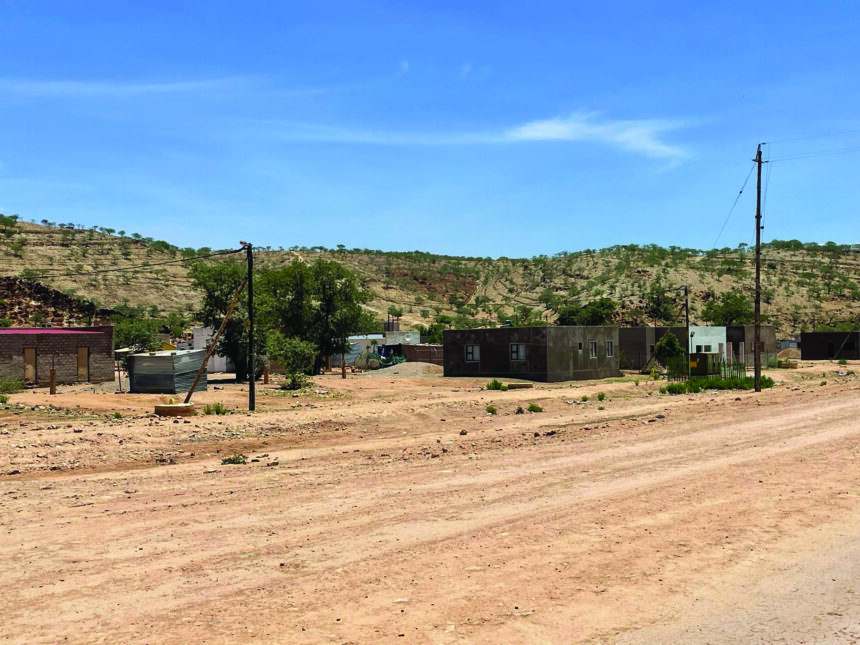OPUWO – Kunene’s regional capital is running out of water, a situation that has prompted the town council to deploy a myriad of interventions, CEO Matjandjara Katurota confirmed.
The town’s water woes are further worsened by the fact that the town council currently loses about 40% of its water due to theft, leakages or malfunctioning meters.
“This is also contributing to our debt to NamWater because this 40% that we lose has to be paid,” she said.
To mitigate this, Katurota was blunt.
“We just must give the community water. If everyone has access to water, then obviously it will reduce theft of water,” she stated.
The town council owes NamWater about N$40 million.
“Our water is supplied by NamWater. But water is scarce, as the existing boreholes cannot meet the required supply. The water demand for Opuwo is about 190 cubic meters (m³) per hour. Now, we are only getting about 90 m³.
“Furthermore, water quality is compromised by the fact that to meet the demand of at least about 120 m³, unpurified water is added. This compromises the quality,” Katurota said in an interview with this publication on Monday.
Due to the poor quality of water, the network is compromised by the newly-installed meters.
“Due to the lime that is contained in the water, the water meters are unable to detect those who are defaulting on their payments. Therefore, it malfunctions. Some residents drink water free of charge. To address this, we have engaged NamWater to come up with a short-term intervention to resolve this problem,” she said.
To mitigate the situation, the town council has been in constant contact with NamWater, the water ministry and the Ministry of Urban and Rural Development.
Earlier this year, NamWater addressed the challenges posed by deteriorating water quality and insufficiency.
It initiated short-, medium- and long-term interventions to address the situation. As such, NamWater is replacing the membranes at the Opuwo reverse osmosis plant to immediately restore the supply of treated water.
In addition to the water treatment, NamWater planned to drill new boreholes in the south-eastern wellfield (Omanduu and Okovaeve villages).
Assessments have shown better water quality than the current boreholes.
These boreholes will reduce reliance on the existing, low-quality water sources. As part of short-term measures, two new boreholes were recently drilled and connected to the treatment plant, providing a combined yield of 22 m³/hour.
Furthermore, in the medium- term, a major project to drill 20 new boreholes in the southeastern wellfield is underway.
This includes 13 production boreholes and seven standby boreholes to meet Opuwo’s projected water demand of 3 040 m³/day by the 2036 financial year.
Hope
It is, however, not doom and gloom, Katurota said.
“The community cannot be blamed. They don’t owe NamWater anything. They get water from the town council. They are right to demand better services. People want water immediately. Existing plans do not speak to that,” she lamented.
Resultantly, the council reached out to the urban and rural development ministry.
“The ministry gave us funding to drill boreholes. We are busy drilling boreholes at Otjorungondo that have yielded enough water in the short-term. The understanding is that these boreholes will provide us with 30 m³ per hour.
“This will reduce the burden. Then the left side will receive water from Namwater, while the right side will get water from the town council,” she added.
This project to drill boreholes, power, store and connect them to the main water network is being done to the tune of around N$15 million.
The council is also drilling a further two boreholes at Otuzemba to cater to those residents who are largely unconnected to the main water network.
Katurota hastened to say that this does not mean the town council is entering into direct competition with NamWater, as theirs are short-term interventions.
“There are those asking if we are taking over from NamWater. The answer is no. According to Namwater, there is also no clash in our mandates. It has been proven that our underground water is minimal. Our aquifer can run dry at any time, hence the government’s long-term plan to get water from Ruacana. Opuwo is insufficient. Therefore, the long-term solution lies with NamWater. But we cannot sit and watch while residents suffer,” she added.
The construction of an earth dam as a catchment for flood water is also on the cards.
“This water can be purified for consumption and backyard gardens to improve food security in the town. We are also encouraging residents to store water in tanks and storages to have water when we close taps during rationing hours at night,” she said.
Agenda
Since taking charge of the town council about two years ago, Katurota centred her agenda on delivering water, improved sanitation, land and housing delivery.
Asked how the town is faring in this regard, she said “the current oxidation ponds are inadequate, as they were built for a smaller population. But because the town is growing, being the capital of the region, N$100 million has been earmarked for the decommissioning of the existing ponds.
The tender is running and will be done in phases. The first phase will cost around N$25 million”.
So far, the council provided around 300 plots to the Shack Dwellers Federation of Namibia and over 100 to the Build Together initiative. “Council handed over 30 houses, of which 11 were built with council funds,” Katurota added.
To keep the town clean, the council has also embarked on an aggressive campaign.
Presently, 50 youth volunteers are roped in quarterly to collect litter around the town.
“Cleaning the town does not require a lot of money. We came up with a strategy for the community to be responsible for their waste. We will soon open a buy-back centre for litter so that the waste can be recycled or reused. We have also cleared the dumping site. After getting environmental clearance, we will create a recycling centre, and not necessarily a dumping site,” she noted. -emumbuu@nepc.com.na



